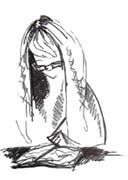 It just drives me nuts when scholars get all gung-ho about footnotes, and the guy who annotated my copy of DUBLINERS has what can only be termed a "footnote-fetish". Is it really necessary to break up a single sentence twice to explain first, what an altar is, and second, a chalice? And he felt it necessary to identify several street names as "a street in Dublin" when the title of the book is DUBLINERS. I should've known, I guess; my edition of the book is about 3 times the size of any other copy I've seen--and that makes perfect sense, given that it has a 30-page introduction, a section titled "Notes on Introduction", another titled "Notes on the Text", three separate appendices, and--finally--the dreaded Notes. I know footnotes are wonderfully helpful when properly used, and what I wouldn't give for a few in, say, Lolita, where Nabokov spouts out French without translation (oh, to have paid attention in high school!), but this "street in Dublin" business is a bit obsessive. There's a map in the front cover, for crying out loud. Anyway. Why don't I move away from the scholarly sidenotes, and tell you a bit about the book?
It just drives me nuts when scholars get all gung-ho about footnotes, and the guy who annotated my copy of DUBLINERS has what can only be termed a "footnote-fetish". Is it really necessary to break up a single sentence twice to explain first, what an altar is, and second, a chalice? And he felt it necessary to identify several street names as "a street in Dublin" when the title of the book is DUBLINERS. I should've known, I guess; my edition of the book is about 3 times the size of any other copy I've seen--and that makes perfect sense, given that it has a 30-page introduction, a section titled "Notes on Introduction", another titled "Notes on the Text", three separate appendices, and--finally--the dreaded Notes. I know footnotes are wonderfully helpful when properly used, and what I wouldn't give for a few in, say, Lolita, where Nabokov spouts out French without translation (oh, to have paid attention in high school!), but this "street in Dublin" business is a bit obsessive. There's a map in the front cover, for crying out loud. Anyway. Why don't I move away from the scholarly sidenotes, and tell you a bit about the book?Apparently Joyce was only twenty-five when he published this book, and I hear it was his first. DUBLINERS is a collection of short stories, each centering on one person or situation or misadventure, all taking place in...here it comes...Dublin. (Didn't need a footnote for that, did you?) Some are told by children, some by lovers or workers or politicians, and Joyce draws each story like a brushstroke so that each piece, while complete in its own right, shines brighter as part of the Big Picture. Now, the footnotes might have been helpful here, since I know little of the Irish political climate (militant Catholicism, those damn Britons, something about potatoes--let me be the first to admit that I know nothing), but sadly, the footnotes weren't helpful. They referenced other political events that I'd never heard of and blah blah blah. Back to the book!
So, most of the stories held a common thread of sorrow--an eerie shimmering thing that held the whole thing in place. Some of my favorites were "Eveline", about a young woman on the brink of leaving her failing family for marriage and a new home; "A Little Cloud," about a timid man who meets a friend just back from London for a drink; and, lastly (but not leastly), "The Dead," Joyce's finishing story, which starts off a bit slow (a mild-mannered dinner party, a parlor) but gathers steam quick once it gets started.
One of the most beautiful moments I've read lately is when Gabriel (of "The Dead") watches his wife as she pauses on the stairs to listen to a song being sung in another room. Chilling. It more than makes up for the footnotes.
RATING: 3

No comments:
Post a Comment